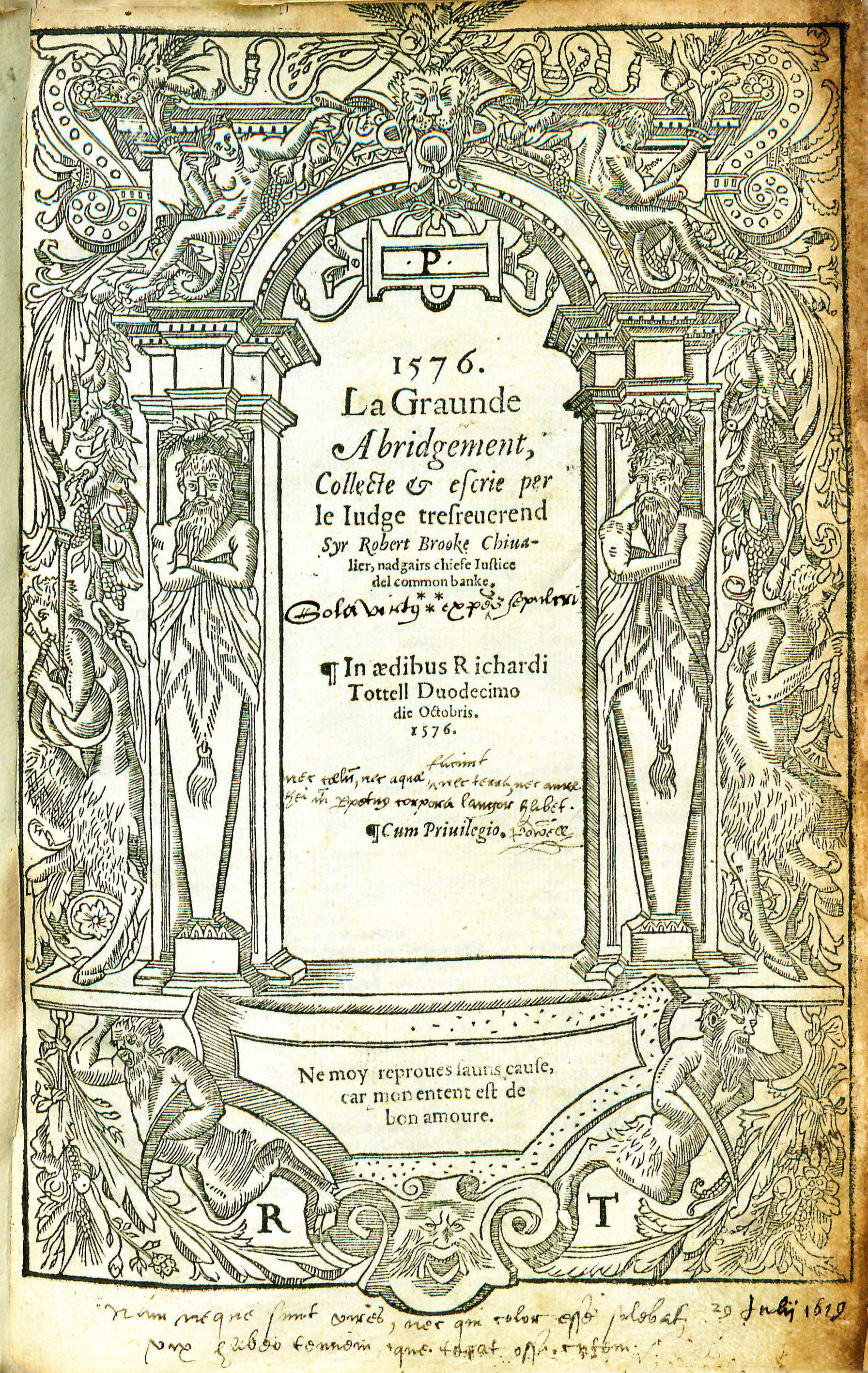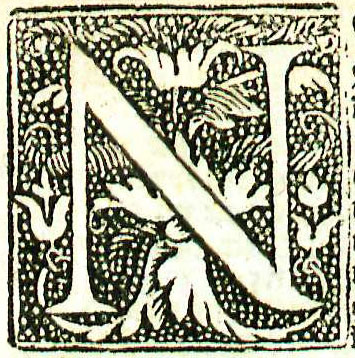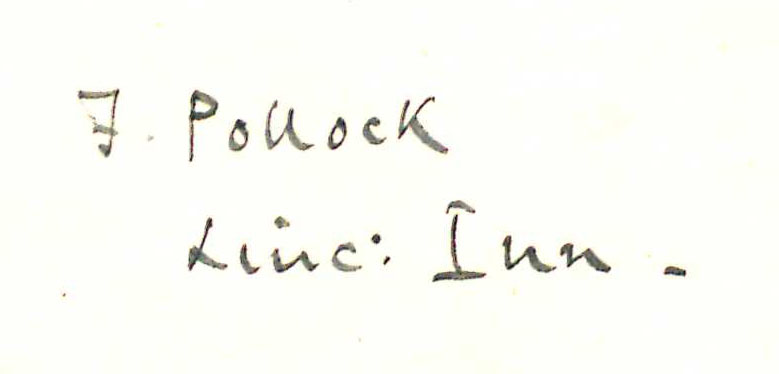Difference between revisions of "Graunde Abridgement"
(→References) |
m |
||
| (14 intermediate revisions by 4 users not shown) | |||
| Line 1: | Line 1: | ||
{{DISPLAYTITLE:''La Graunde Abridgement''}} | {{DISPLAYTITLE:''La Graunde Abridgement''}} | ||
===by Sir Robert Brooke=== | ===by Sir Robert Brooke=== | ||
| − | |||
{{BookPageInfoBox | {{BookPageInfoBox | ||
|imagename=BrookeGraundeAbridgement1576.jpg | |imagename=BrookeGraundeAbridgement1576.jpg | ||
| − | |link=https:// | + | |link=https://wm.primo.exlibrisgroup.com/permalink/01COWM_INST/g9pr7p/alma991018197569703196 |
|shorttitle=Le Graunde Abridgement | |shorttitle=Le Graunde Abridgement | ||
| − | |author=Sir Robert Brooke | + | |author=[[:Category: Robert Brooke|Sir Robert Brooke]] |
|edition=Second | |edition=Second | ||
| − | |lang= | + | |lang=[[:Category: French|French]] |
| − | |publoc=London | + | |publoc=[[:Category: London|London]] |
|publisher=R. Tottyl | |publisher=R. Tottyl | ||
|year=1576 | |year=1576 | ||
| − | |set= | + | |set=Two volumes in one |
| − | |desc=4to (25 cm.) | + | |desc=[[:Category: Quartos|4to]] (25 cm.) |
| − | }}[ | + | |shelf=E-3 |
| + | }}[[wikipedia:Robert Broke|Sir Robert Brooke]] (sometimes Brook or Broke) (d.1558) was a judge, legal writer and Speaker of the House of Commons.<ref>J. H. Baker, "[http://www.oxforddnb.com/view/article/3497 Broke, Sir Robert (d. 1558)]", ''Oxford Dictionary of National Biography'', accessed May 29, 2013. Subsequent biographical facts also derive from this article.</ref> He came to the [[wikipedia:Middle Temple|Middle Temple]] between 1525 and 1528, and after appointments as common sergeant of the courts of London (1536) and recorder (1545), Brooke was elevated to Chief Justice of the [[wikipedia:Court of Common Pleas (England)|Court of Common Pleas]] in 1554. Brooke's chief claim to fame, ''La Graunde Abridgement'', was published posthumously in 1573. | ||
| + | |||
| + | [[File:BrookeGraundeAbridgment1576Initial.jpg|left|thumb|200px|<center>Initial capital, first page of text.</center>]] | ||
| + | <div style="overflow: hidden;"><blockquote> | ||
| + | [Brooke's ''Abridgement''] was more ambitious even than Fitzherbert's ''Graunde Abridgement'', containing over 20,000 entries digested under a wider range of titles, and had useful marginal notes guiding the reader more readily to the contents. Contemporaries found it easier to use than Fitzherbert, and it is still a valuable reference tool. Although the abridgement was primarily derived from the medieval year-books, Broke added a number of cases from his own observation, some statutes and other sources, and even a few extracts from readings in the inns of court. The contemporary cases, though only briefly noted, may be considered as original law reports.<ref>Ibid.</ref> | ||
| + | </blockquote></div> | ||
| − | + | [[File:BrookeGraundeAbridgment1576inscription.jpg|left|thumb|400px|<center>Owner's inscription, front pastedown.</center>]] | |
| − | [[File: | ||
==Evidence for Inclusion in Wythe's Library== | ==Evidence for Inclusion in Wythe's Library== | ||
Both [[Dean Bibliography|Dean's Memo]]<ref>[[Dean Bibliography|Memorandum from Barbara C. Dean]], Colonial Williamsburg Found., to Mrs. Stiverson, Colonial Williamsburg Found. (June 16, 1975), 9 (on file at Wolf Law Library, College of William & Mary).</ref> and the [https://digitalarchive.wm.edu/handle/10288/13433 Brown Bibliography]<ref>Bennie Brown, "The Library of George Wythe of Williamsburg and Richmond," (unpublished manuscript, May, 2012) Microsoft Word file. Earlier edition available at: https://digitalarchive.wm.edu/handle/10288/13433.</ref> suggest Wythe owned this title based on notes in John Marshall's commonplace book.<ref>Herbert A. Johnson, Charles T. Cullen, and Nancy G. Harris, eds., ''The Papers of John Marshall'', (Chapel Hill: The University of North Carolina Press, in association with the Institute of Early American History and Culture, 1974), 1:41.</ref> | Both [[Dean Bibliography|Dean's Memo]]<ref>[[Dean Bibliography|Memorandum from Barbara C. Dean]], Colonial Williamsburg Found., to Mrs. Stiverson, Colonial Williamsburg Found. (June 16, 1975), 9 (on file at Wolf Law Library, College of William & Mary).</ref> and the [https://digitalarchive.wm.edu/handle/10288/13433 Brown Bibliography]<ref>Bennie Brown, "The Library of George Wythe of Williamsburg and Richmond," (unpublished manuscript, May, 2012) Microsoft Word file. Earlier edition available at: https://digitalarchive.wm.edu/handle/10288/13433.</ref> suggest Wythe owned this title based on notes in John Marshall's commonplace book.<ref>Herbert A. Johnson, Charles T. Cullen, and Nancy G. Harris, eds., ''The Papers of John Marshall'', (Chapel Hill: The University of North Carolina Press, in association with the Institute of Early American History and Culture, 1974), 1:41.</ref> | ||
| Line 24: | Line 28: | ||
Bound in later calf with blind rules to boards and renewed endpapers. Recently rebacked with raised bands and lettering piece and mended hinges. Title page printed within woodcut architectural borders with woodcut initials. Includes previous owner's inscription, "F. Pollock, Linc. Inn." on front pastedown. Purchased from The Lawbook Exchange, Ltd. | Bound in later calf with blind rules to boards and renewed endpapers. Recently rebacked with raised bands and lettering piece and mended hinges. Title page printed within woodcut architectural borders with woodcut initials. Includes previous owner's inscription, "F. Pollock, Linc. Inn." on front pastedown. Purchased from The Lawbook Exchange, Ltd. | ||
| − | View this book in [https:// | + | Images of the library's copy of this book are [https://www.flickr.com/photos/wolflawlibrary/albums/72157657876738781 available on Flickr.] View the record for this book in [https://wm.primo.exlibrisgroup.com/permalink/01COWM_INST/g9pr7p/alma991018197569703196 William & Mary's online catalog.] |
| + | |||
| + | ===Full text=== | ||
| + | <div style="overflow: hidden;"> | ||
| + | *[http://lawlibrary.wm.edu/wythepedia/library/BrookeGraundeAbridgement1576Vol1.pdf Volume I] (75MB PDF) | ||
| + | *[http://lawlibrary.wm.edu/wythepedia/library/BrookeGraundeAbridgement1576Vol2.pdf Volume II] (71MB PDF) | ||
| + | </div> | ||
| + | |||
| + | ==See also== | ||
| + | *[[George Wythe Room]] | ||
| + | *[[Wythe's Library]] | ||
| + | |||
==References== | ==References== | ||
| − | |||
<references/> | <references/> | ||
| + | __NOTOC__ | ||
[[Category:Abridgments]] | [[Category:Abridgments]] | ||
[[Category:Case Reports]] | [[Category:Case Reports]] | ||
[[Category:George Wythe Collection at William & Mary's Wolf Law Library]] | [[Category:George Wythe Collection at William & Mary's Wolf Law Library]] | ||
| + | [[Category:Robert Brooke]] | ||
[[Category:Titles in Wythe's Library]] | [[Category:Titles in Wythe's Library]] | ||
| − | [[Category: | + | |
| + | [[Category:French]] | ||
| + | [[Category:London]] | ||
| + | [[Category:Quartos]] | ||
Latest revision as of 10:33, 23 May 2024
by Sir Robert Brooke
| Le Graunde Abridgement | |
|
Title page from Le Graunde Abridgement, George Wythe Collection, Wolf Law Library, College of William & Mary. | |
| Author | Sir Robert Brooke |
| Published | London: R. Tottyl |
| Date | 1576 |
| Edition | Second |
| Language | French |
| Volumes | Two volumes in one volume set |
| Desc. | 4to (25 cm.) |
| Location | Shelf E-3 |
Sir Robert Brooke (sometimes Brook or Broke) (d.1558) was a judge, legal writer and Speaker of the House of Commons.[1] He came to the Middle Temple between 1525 and 1528, and after appointments as common sergeant of the courts of London (1536) and recorder (1545), Brooke was elevated to Chief Justice of the Court of Common Pleas in 1554. Brooke's chief claim to fame, La Graunde Abridgement, was published posthumously in 1573.
Evidence for Inclusion in Wythe's Library
Both Dean's Memo[3] and the Brown Bibliography[4] suggest Wythe owned this title based on notes in John Marshall's commonplace book.[5]
Description of the Wolf Law Library's copy
Bound in later calf with blind rules to boards and renewed endpapers. Recently rebacked with raised bands and lettering piece and mended hinges. Title page printed within woodcut architectural borders with woodcut initials. Includes previous owner's inscription, "F. Pollock, Linc. Inn." on front pastedown. Purchased from The Lawbook Exchange, Ltd.
Images of the library's copy of this book are available on Flickr. View the record for this book in William & Mary's online catalog.
Full text
See also
References
- ↑ J. H. Baker, "Broke, Sir Robert (d. 1558)", Oxford Dictionary of National Biography, accessed May 29, 2013. Subsequent biographical facts also derive from this article.
- ↑ Ibid.
- ↑ Memorandum from Barbara C. Dean, Colonial Williamsburg Found., to Mrs. Stiverson, Colonial Williamsburg Found. (June 16, 1975), 9 (on file at Wolf Law Library, College of William & Mary).
- ↑ Bennie Brown, "The Library of George Wythe of Williamsburg and Richmond," (unpublished manuscript, May, 2012) Microsoft Word file. Earlier edition available at: https://digitalarchive.wm.edu/handle/10288/13433.
- ↑ Herbert A. Johnson, Charles T. Cullen, and Nancy G. Harris, eds., The Papers of John Marshall, (Chapel Hill: The University of North Carolina Press, in association with the Institute of Early American History and Culture, 1974), 1:41.


